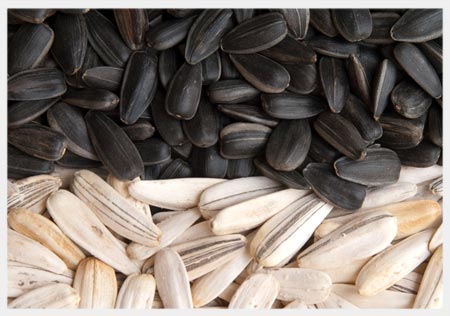
Botanically termed as Helianthus Annuus, the sunflower is an annual flowering plant in Asteraceae family. This plant is famous for its extremely large and vividly yellow blooms. A native to South America, it was domesticated around 1500 BC. They are now cultivated worldwide for their oil-rich and highly nutritious seeds.
The sunflower plant is about 3-5′ tall, with a light green, pale reddish green, or purple stem. The leaf blades are up to 7″ long and 3″ across; they are broadly lanceolate to ovate with long slender tips and sharply serrated margins. Its flowers are actually composed of hundreds of tiny florets (small flowers) packed together. Sunflowers actually follow the sun, with heads which face east in the morning, and slowly track the sun across the sky.
Sunflower Oil
It is the pale yellow mild-flavored oil extracted from the seed of the sunflower plant. This grade of vegetable oil contains higher concentrations of polyunsaturated fat; whereas the quantity of saturated fat is low. It is rich in vitamins A,C, D, and E. The high Vitamin E content makes this oil especially helpful for delicate and dry skin. It is light in taste and appearance, and supplies more Vitamin E than any other vegetable oil. There are three types of sunflower oil available; NuSun, linoleic and high oleic sunflower oil.
Sunflower oil contains predominantly linoleic acid in triglyceride form. Its major contents are:
- Palmitic acid : 4 – 9%,
- Stearic acid : 1 – 7%,
- Oleic acid : 14 – 40%,
- Linoleic acid : 48 – 74%
Other Physical Properties:
- Smoke point (refined): 230 °C/440 °F
- Smoke point (unrefined): 107 °C/225 °F
- Density (25 ºC): 917 kg/m3
- Refractive index (25 ºC): ≈1.473.
Nutritional Contents
Sunflower Oil, a blend of various nutrients and vitamins, offers a great everyday solution for your culinary needs. It is suitable for medium to high temperature cooking and baking. Linoleic sunflower oil, the commonly used cooking oil, has higher levels of the essential fatty acids called polyunsaturated fat. High oleic sunflower oils are classified as having monounsaturated levels of 80% and above. Diets combined with a low fat content and high levels of oleic acid have been suggested to lower cholesterol which, in turn, results in a smaller risk of heart disease.
Health Benefits
- Sunflower oil is a great source of the essential fatty acids necessary for the production of prostaglandins
- Being a good source of vitamins and minerals it provides a naturally balanced diet for a healthy body
- When applied to skin, it can retain moisture in the skin
- Lower concentrations of saturated fats help in lowering the cholesterol level
- It also provides a protective barrier that resists infection in pre-term infants.